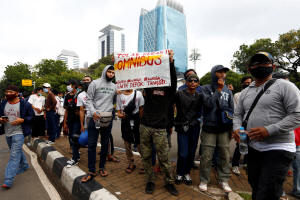|
Dressed in yellow, blue and green jackets denoting their
universities, students demanded the president, widely known as
Jokowi, revoke the so-called ‘omnibus’ bill that critics say
harms labour rights and the environment.
"Our main problem here is that the bill does not accommodate
what the people want," Remy Hastian, a student from the State
University of Jakarta, told Reuters at the rally.
It was the latest in a series of protests that have erupted
across the archipelago in recent weeks, some of which have ended
in sporadic violence and thousands of arrests.
"When I graduate, there won't be a job for me," said Sigit Ari
Sandi, a student from Bogor, who singled out measures aimed at
loosening rules on minimum wages.
Tuesday’s protest, which was joined by joined by labour groups,
marked one year since Jokowi was inaugurated for a second term
in office.
He comfortably won the re-election last year but in an opinion
poll released by Kompas newspaper on Tuesday, 46.3% of
respondents said they were dissatisfied with the first year of
his second term, while 39.7% said they were satisfied.
On Tuesday, Jokowi is meeting Japanese Prime Minister Yoshihide
Suga, who is visiting Southeast Asia's largest economy for talks
that will cover security and are likely to include investment.
The flagship jobs legislation, a revision of more than 70
existing laws that was passed on Oct 5, is designed to remove
longstanding impediments to doing business by cutting red tape,
easing restrictions on foreign investment and boosting labour
market competitiveness. The government says it will lead to
widespread employment generation.
But trade unions, student groups, academics and civil society
groups say the legislation harms protection for workers,
including those on minimum wages, severance pay and maternity
benefits, and weakens environmental protection.
(Additional reporting by Stanley Widianto; Writing by Kate Lamb;
Editing by Ed Davies and Raju Gopalakrishnan)
[© 2020 Thomson Reuters. All rights
reserved.] Copyright 2020 Reuters. All rights reserved. This material may not be published,
broadcast, rewritten or redistributed.
Thompson Reuters is solely responsible for this content.

|
|






